A session devoted to co-innovation under pandemic restrictions closes the 2020 cycle.
Several countries, November 26, 2020. The seminar "Co-innovation in the agro-food sector under pandemic restrictions" has closed the cycle of virtual seminars organised by the Resilient Food Production sector between December 2019 and December 2020, with the aim of facilitating multi-sector exchange among key actors of the EUROCLIMA+ programme. Dr. Andrea Schloenvoigt, Technical Expert for Technical Assistance of the Resilient Food Production sector, answers some questions about the results.
The seminar brought together the experiences of three of the 10 projects that the EUROCLIMA+ programme is supporting in the agro-food sector in their co-innovation strategies, a highly participatory approach involving different actors at different levels of participation, which has been affected by the restrictions imposed by the COVID19 pandemic.
For Eng. María Eugenia Carriquiry, Coordinator of the EUROCLIMA+ project Resilient Family Livestock Production (CNFR/CORPOFAM-INIA) in Uruguay, co-innovation could be maintained due to a favourable environment, in which there had already been progress on co-innovation practices with local organisations, access to climate financing, and Best Practices for Livestock Production (BPG) validated nationally.
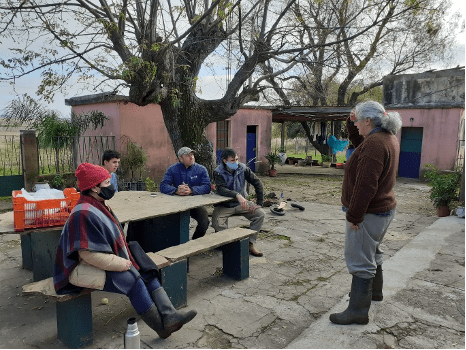 Innovation process in Family Livestock Production Innovation process in Family Livestock Production |
From the adjustments made, we learned that complying with health protocols allows us to continue carrying out field activities with families under the established conditions and that good internet coverage has been another great advantage for producers and leaders of organisations to develop new skills in the use of TICs and social networks.
In the case of the Resilients project (INTA-CIPAV), COVID-19 directly affected the working modality, based on days for collective discussions between the technical teams and the 200 producing families from the four intervention areas in Argentina and Colombia. This scenario was compounded by extreme weather events such as fires in the Córdoba area and snowfalls in the Patagonia area. Dr. Edurne Battista, Coordinator of the project's La Plata Intervention Area, reported on how the Resilient management teams used virtual meetings and cell phones as new communication channels.
|
Example of co-innovation: Strengthening short sales channels for fresh vegetables in La Plata (Buenos Aires). Source: Edurne Battista |
In the La Plata area, short marketing channels for fresh vegetables in peri-urban areas were also strengthened: the supply of foods does not stop in when facing a pandemic and has put the importance of Family Farming on the table.
"Co-innovation: A strategy for resilient food production in family agriculture in the context of a pandemic in Honduras" was the title of the talk given by Douglas Benavidez, Coordinator of the EUROCLIMA+ project Climate Resilient Family Agriculture -RFP (SNV-ASOMAINCUPACO-OPCC). In a pandemic context, to which the impact of the 2020 hurricanes Iota and Eta in the project's area of influence is added, Benavidez highlighted, among the main lessons learned, that adaptive management (flexibility for adjustment), the organisational structure of the management unit and the multi-stakeholder and multi-level approach strategy, have been elements that have generated favourable conditions for the co-innovation process. Co-innovation, however, in the face of three unfavourable external elements (Eta, Iota and the pandemic), also reached its limits.
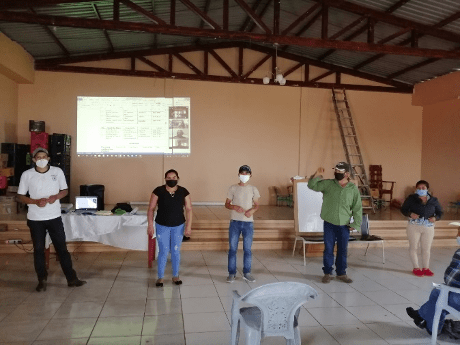 |
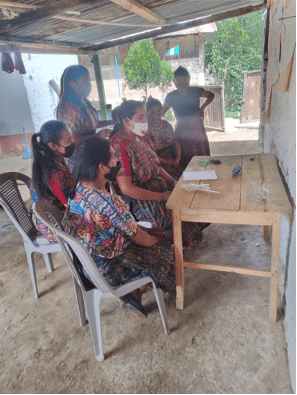 |
From the seminar, Dr. Andrea Schloenvoigt, Technical Expert of the EUROCLIMA+ programme for Technical Assistance in the Resilient Food Production sector, commissioned by Expertise France, points out that the pandemic is here to stay. "We are in a phase of acceptance and adaptation to a new normal in which the systematic organisation in multi-actor and multi-level cooperation networks is key to success, with the support of information and communication technologies", she concluded.
Regarding the webinars, Schloenvoigt answered several questions.
EUROCLIMA+ : Have the objectives set with the cycle of virtual seminars been met?
Andrea Shcloenvoigt : Yes! Completely! The webinar series was an offer designed at the request of key project stakeholders and National Focal Points of the EUROCLIMA+ Programme. In cooperation with project implementing organisations in the AFOLU sector (agriculture, forestry and other land uses), we offered a virtual space to stimulate reflections on different approaches that aim to contribute to the implementation of the Paris Agreement. To this end, we sought to integrate the agrifood perspective, disaster risk reduction, forests and biodiversity, and climate governance.
Originally, we expected to reach about 40 people on average per event. However, we decided to open the series to all interested audiences. Now, if we add the 13 events between September 2019 and November 2020, we have made about 1400 connections, that is, on average, more than 100 people per event. People registered as participants in the series received the technical notes, PDFs of the presentations and links to the videos of the events on YouTube. The participants considered that the contents discussed are important to consider in their work. The audience reached professionals from the public and private sectors, academia, and civil society in 17 EUROCLIMA+ programme countries. In addition, to date we have more than 800 views of the videos on YouTube and about 2200 views of the technical notes available on the programme website.
EC+ : What do you take away as lessons learned from the seminars?
A.S. : The virtual series responds to the need formulated to strengthen the technical and methodological capacities in 18 countries of the programme. The secret of its success is due to the cooperation of the executors and other key actors of the programme, who contributed with their own experiences relevant to the topics they prioritised on the occasion of the regional meeting of projects in 2019.
A traditional format was chosen for the ZOOM platform: a 90-minute webinar with three 15-minute presentations on the main theme, each with its own question and answer space, to activate the audience frequently, and conclusions by the moderator. As participation in the events increased, we offered a "Post-Webinar Dialogue with the Panellists" space to answer questions that would have remained unanswered during the event.
For each event, the moderator developed a PPT guide with key questions to be answered and held a meeting with the parties to agree on key contents. Even so, a certain level of diversity and creativity was allowed by the presenters.
Thanks to the pandemic, today we have become accustomed to new virtual tools, which allow greater interaction with the audience. In addition to the final evaluation of each event by the participants, at the end we included consultations in plenary, e.g. with mentimeter. We opted for webinars without using the video of the panellists to ensure the best possible audio and transmission of presentations. Not seeing the person presenting may be perceived as anonymous.
The organisation and implementation of each webinar has been a team effort for covering logistics, communication, contents and moderation. The pandemic launched a wave of webinars starting in June, with which we entered into "competition". Now, it is very important that the events are promoted on social and professional networks: we learned on the fly how to improve this part.
|
|
EC+ : The subjects of the seminars has been quite varied : Which one was of the most interest?
A.S. : When the countries ordered a curfew between March and May, the monthly participation numbers exploded. Because of this, it is not possible to say which topic has been of greater interest, based only on the number of participants. If we also consider views of videos on YouTube and views of technical notes, the greatest interest to date has been in rural financing mechanisms for climate resiliente family agriculture, followed by Ecosystem-based Adaptation in the agrifood sector, Advancing Climate Action to 2019, ancestral knowledge in the development of agrifood value chains and methodological advances to respond to weather risks in the agrifood sector.
EC+ : What are the next plans?
A.S. : From the Resilient Food Production sector, we want to compile the technical notes in a technical publication for the interested public, putting in context the supported projects and the objectives of the EUROCLIMA+ programme.
Also, for next year, we are thinking about a new format for deepening pending issues to be prioritised with key actors. Among the first topics suggested are: Integrating the gender and transgenerational approach in project design, and promoting green recovery in the agricultural sector, Strengthening monitoring of adaptation to climate change, Learning about Euroclima+ Solutions.
About the RFP virtual seminars
Since September 2019, the RFP virtual seminars have brought together the key actors of the EUROCLIMA+ programme to promote multisectoral exchanges and the strengthening of technical and methodological capacities based on experiences generated in the projects.
The presentation and sharing of these comprehensive experiences aims to support the scaling up of best practices in the agriculture, forestry and other land use sector (AFOLU) and to promote vertical and horizontal governance, improved policies and strategies, financing mechanisms for climate change adaptation and mitigation, or to strengthen monitoring systems for periodic country reports. Facilitating these experiences is supposed to support the implementation of nationally determined contributions (NDCs) to the Paris Agreement of the United Nations Framework Convention on Climate Change.
The integration of gender and trans-generational approaches are important cross-cutting issues.
For more information: This email address is being protected from spambots. You need JavaScript enabled to view it.

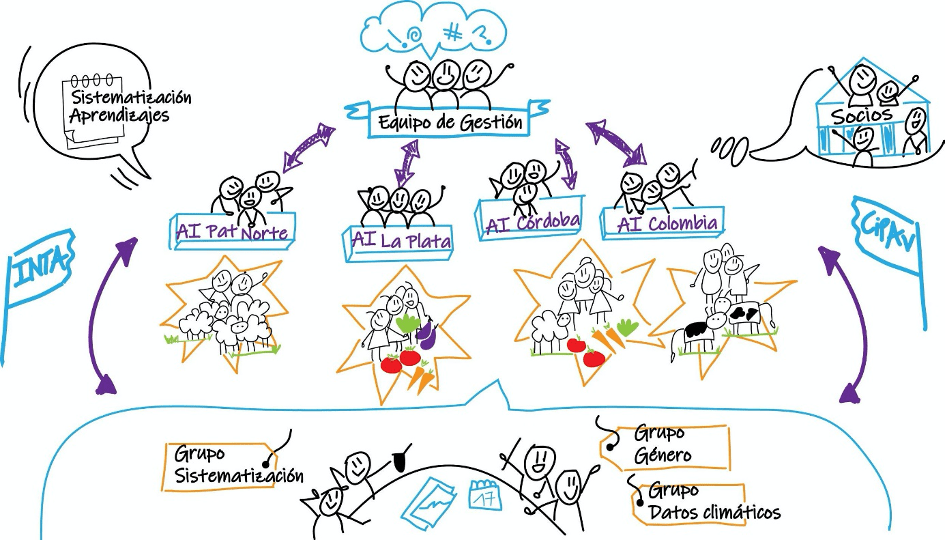
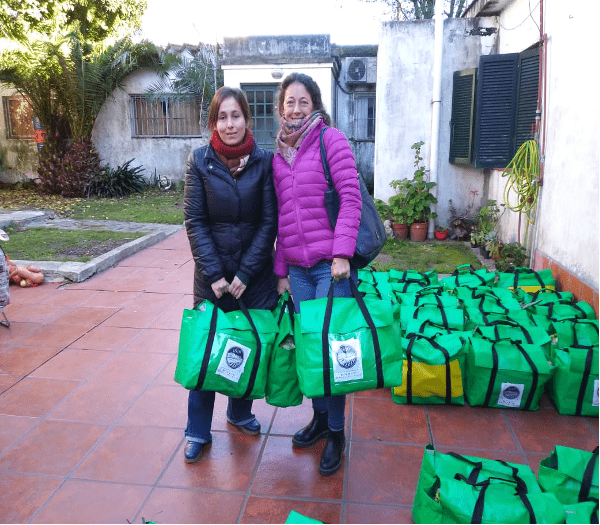
 Screenshot of the presentation of the last RFP virtual seminar of the year 2020.
Screenshot of the presentation of the last RFP virtual seminar of the year 2020.
